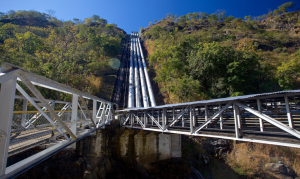Cape Town, South Africa – 17 November 2025 – As Africa’s energy demand surges, balancing decarbonisation with energy security has never been more critical. New data from the International Energy Agency (IEA) underscores a pivotal role for both renewable energy and natural gas in driving a sustainable, yet reliable, power future for the continent.
Key Findings & Context
- Electricity Demand Is Exploding
- The IEA projects Africa’s electricity demand will rise by 4.1% in 2025.
- To meet this demand sustainably, the IEA report forecasts that over 60 TWh of new generation (2023–2025) will come from renewables, increasing their share of total generation from about 24% in 2021 to nearly 30% by 2025
- At the same time, natural gas capacity is expected to grow: Africa’s gas-fired electricity is projected to increase by ~30 TWh by 2025, reaching almost 400 TWh.
- Shift in Investment Flows
- According to the IEA’s World Energy Investment 2025 report, private-sector clean energy investment in Africa has nearly tripled, rising from ~US$ 17 billion in 2019 to almost US$ 40 billion in 2024.
- However, public and DFI (development finance institution) funding has declined sharply — falling by about one‑third over the past decade to reach US$ 20 billion in 2024.
- Much of this drop is linked to reduced commitments from some development partners, including Chinese DFIs.
- Natural Gas as a Transition Fuel
- While fossil fuel investment is declining globally, natural gas remains an important transitional fuel in Africa’s energy mix: several analyses highlight that gas—especially in combined cycle power plants—offers flexible capacity that complements variable renewables.
- In parts of Africa, natural gas already accounts for a significant share of the energy mix.
- According to the Department of Mineral Resources in South Africa, natural gas makes up 41% of its power generation mix, underscoring its role in just transition strategies.
- Just Transition Imperative
- While renewables are growing, energy planners and policymakers must manage the transition in a way that preserves affordability, reliability, and social equity.
- A just energy transition in Africa will require strategic use of gas to ensure firm dispatchability, while also scaling up renewables—and ensuring local communities benefit.

What the Africa Energy Indaba Will Do
At this year’s Africa Energy Indaba, stakeholders will come together to:
- Explore best‑practice case studies where African countries have successfully integrated gas and renewables to maintain grid stability while reducing carbon emissions.
- Facilitate high-level discussions on how to mobilise public and private capital for green infrastructure, with innovative financing models that account for risk, social impacts, and just transition.
- Highlight policy frameworks that support a balanced energy mix: enabling regulators to incentivize renewables growth while using natural gas strategically as a bridging fuel.
- Promote technology and capacity-building, including in firm-dispatchable generation (gas, hybrids), storage, and grid flexibility, to ensure reliable power as renewables scale.
Expected Impact
- Accelerate the pipeline of bankable energy projects that combine clean energy ambition with reliability.
- Attract blended finance from DFIs, private investors, and governments to unlock the dual promise of decarbonisation and energy security.
- Strengthen African energy institutions’ capacity to manage integrated energy systems, reducing risk and increasing resilience.
- Support equitable growth through just-transition frameworks that safeguard communities and create green jobs.
“Our energy future in Africa is not just about reducing emissions — it’s about keeping the lights on, driving industrial growth, and ensuring no one is left behind. Renewables give us decarbonisation; gas gives us security — together, they enable a just transition.” commented Liz Hart, Managing Director of the Africa Energy Indaba. “At the Africa Energy Indaba, we have a unique opportunity to build bridges across sectors – finance, government, developers – and create real, investable energy projects that are both green and reliable.”








